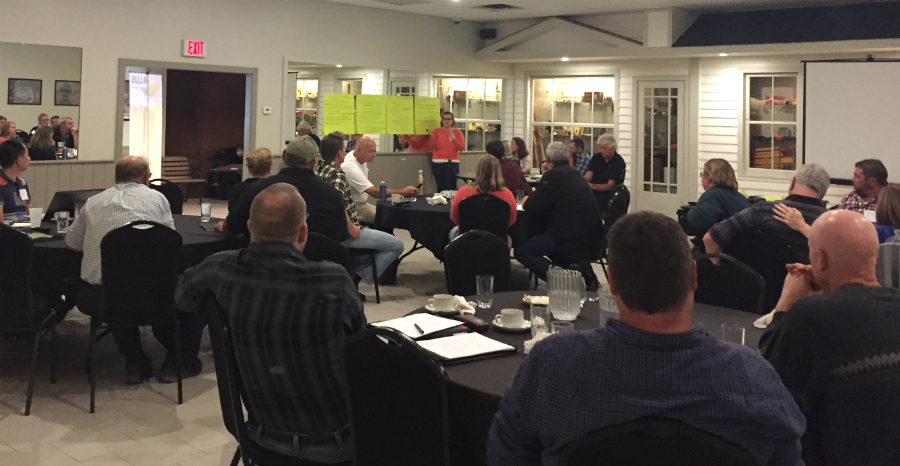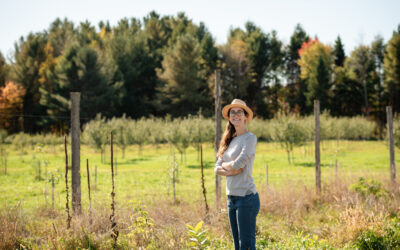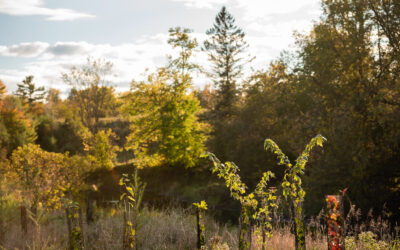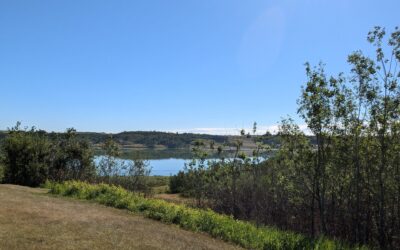ALUS works closely with many organizations across Canada. In September, 2018, we celebrated collaboration in Ontario.
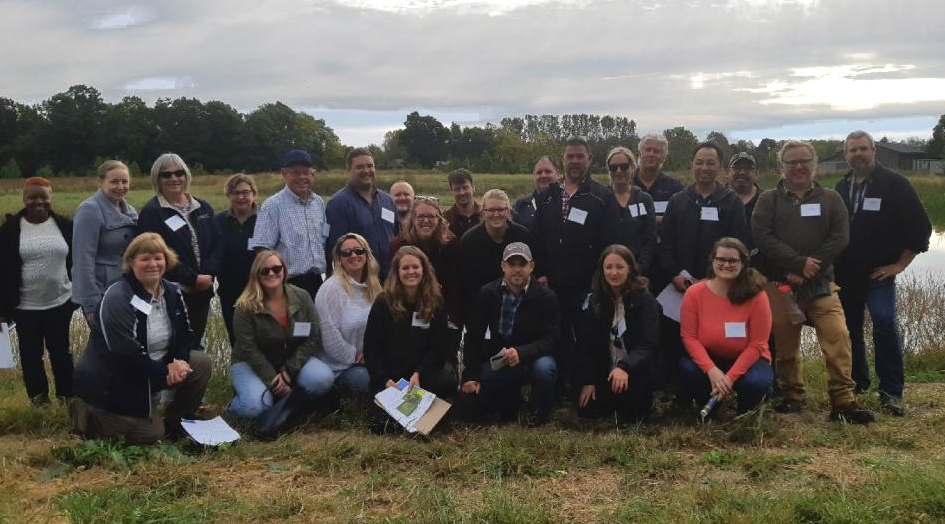
In September, 2018, ALUS Canada’s Eastern Hub brought together 19 organizations to explore opportunities for collaboration across the ALUS network in Ontario. Front Row, L to R: Jo-Anne Harbinson (Saugeen Valley Conservation Authority), Sarah Hedges (Ontario Nature), Lindsay Buchanan (Ontario NativeScape, ALUS Lambton), Alyssa Cousineau (Long Point Region Conservation Authority, ALUS Elgin), Keith Reid (Grey Agricultural Services, ALUS Grey-Bruce), Emma Horrigan (Ontario Nature), Casey Whitelock (ALUS Canada). Middle row, L to R: Michelle Primus (ALUS Canada), Christie Kent (Middlesex County), Kate Monk (Ausable Bayfield Conservation Authority), Holly Shipclark (Kawartha Conservation), John Stewart (ALUS Elgin PAC), Brendan Jacobs (Raisin Region Conservation Authority, ALUS Ontario East), Hillary Heard (ALUS Middlesex), Rachel Scholten (Ducks Unlimited Canada), Steve Bradish (ALUS Middlesex PAC), Stephanie Drayer (ALUS Norfolk), Shawn Shao (University of Guelph), Jim Jones (University of Waterloo), Henry Bakker (Ontario Federation of Anglers and Hunters, ALUS Peterborough). Back Row, L to R: Chris Robinson (Ontario Federation of Anglers and Hunters), Ben Hindmarsh (Ontario Ministry of Agriculture, Farms and Rural Affairs), Tim Payne (St. Clair Region Conservation Authority), Don Ciparis (National Farmers Union—Ontario), Shawn Caughell (ALUS Elgin PAC). Photo by Andrew Barrie (OMAFRA).
One of ALUS Canada’s guiding principles is integration: ALUS works with existing conservation programs, agricultural groups and all levels of government to deliver the program in each ALUS community. Every so often, we have an opportunity to celebrate—and strengthen—these vital connections.
On September 27, 2018, ALUS Canada’s Eastern Hub Manager Casey Whitelock brought together 19 organizations who collaborate closely with ALUS in Ontario. The day-long workshop featured a morning tour of ALUS projects and an afternoon of meetings to discuss strategies for strengthening the delivery of the ALUS program across the province.
In addition to ALUS Canada staffers, all eight ALUS communities in Ontario were well represented—ALUS Middlesex, ALUS Norfolk, ALUS Grey-Bruce (a partnership with Grey Agricultural Services), ALUS Elgin (a partnership with Long Point Region Conservation Authority), ALUS Chatham-Kent (a partnership with Lower Thames Valley Conservation Authority), ALUS Peterborough (a partnership with Ontario Federation of Anglers and Hunters), ALUS Lambton (a partnership with Ontario NativeScape), and ALUS Ontario East (a partnership with Raisin Region Conservation Authority).
Joining the ALUS crew were representatives of key organizations that work closely with ALUS in Ontario, such as the Ausable Bayfield Conservation Authority, Ducks Unlimited Canada, Kawartha Conservation, Middlesex County, National Farmers Union–Ontario (NFU), OMAFRA (Ontario Ministry of Agriculture, Food and Rural Affairs), Ontario Nature, Saugeen Valley Conservation Authority, St. Clair Region Conservation Authority, University of Guelph and University of Waterloo.
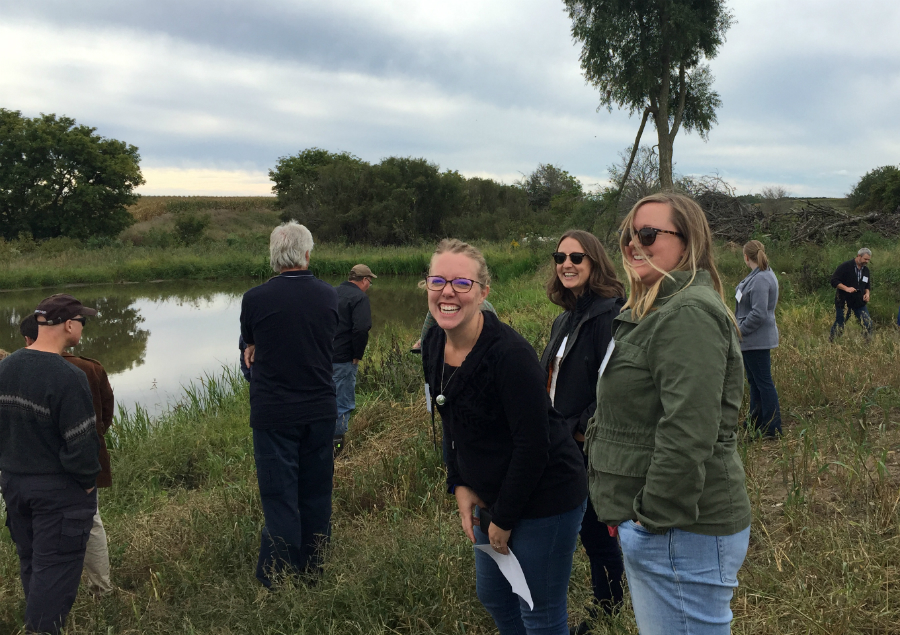
ALUS Middlesex Program Coordinator Hillary Heard (centre) and Ontario Nature staffers Sarah Hedges and Emma Horrigan enjoy a light moment while touring an wetland and sediment basin at an ALUS Elgin project during ALUS Canada’s Eastern Hub workshop.
Many of these organizations, such as the NFU, are long-time ALUS supporters and collaborators. “The NFU has three policy planks, revolving around the economic, social and environmental sustainability of agriculture—ALUS catches all three,” said NFU Counsellor at Large Don Ciparis during the ALUS Elgin tour. “Our executives and members embrace the ALUS concept, and we try to make people aware of the program.”
Other organizations attending the workshop are relatively new to working with ALUS. ALUS Peterborough has only been in existence since 2017, but according to Holly Shipclark, Stewardship Coordinator with Kawartha Conservation, it’s already providing benefits in their region:
“We’re always looking for tools to help landowners do good stewardship on their properties; ALUS is a fantastic tool, and a unique one, that helps farmers move forward with their projects,” said Shipclark, who appreciates the integrated nature of the ALUS program.
“The ALUS Program Coordinator initiates contact with a farmer and starts looking at a project. If Kawartha Conservation has an existing program that fits, we match those together. It’s still early days, but that’s the vision—and we’re starting to see it happen,” she said.

Alyssa Cousineau, ALUS Elgin’s Program Coordinator, conducted a project tour as part of a day-long workshop for collaborators in ALUS Canada’s Eastern Hub. On this site, Cousineau spoke about wetland maintenance, stressing how and why to control the invasive species, Phragmites australis.
Shipclark, Ciparis and the whole group toured three ALUS Elgin sites, showcasing wetland, grassland and sediment-control projects that were established by ALUS in collaboration with several partner organizations, including Long Point Region Conservation Authority, Catfish Creek Conservation Authority, Elgin Clean Water Program, Ontario Soil and Crop Improvement Association and Ducks Unlimited Canada.
Indeed, working with different agencies is a critical part of the job for many ALUS Program Coordinators. “By working with environmental organizations in the area, we’re able to increase our capacity to implement new projects,” says ALUS Elgin Coordinator Alyssa Cousineau. “They help increase our technical knowledge, so we’re able to provide the most ecosystem services we can for our community.”
At the end of the day, this event was the perfect occasion for ALUS Canada, its partner organizations and all its collaborators to work together. “We identified actions for moving forward with an even more cohesive and collaborative network across all ALUS communities in Ontario,” said Whitelock.
With continued support from these important organizations, ALUS will continue to deliver a highly integrated and efficient program, working with farmers and ranchers to produce ecosystem services in local communities.
Acknowledgements
This ALUS Canada Eastern Hub workshop was made possible thanks to funding support from the Government of Ontario, via the Ontario Trillium Foundation. It was hosted by ALUS Canada in partnership with Ontario Nature. Thank you to ALUS Elgin for organizing the project tour, and to the New Sarum Diner for providing a fantastic lunch and venue. We’d also like to thank each organization for participating in the workshop and, as always, for working so effectively with the ALUS program in Ontario.
